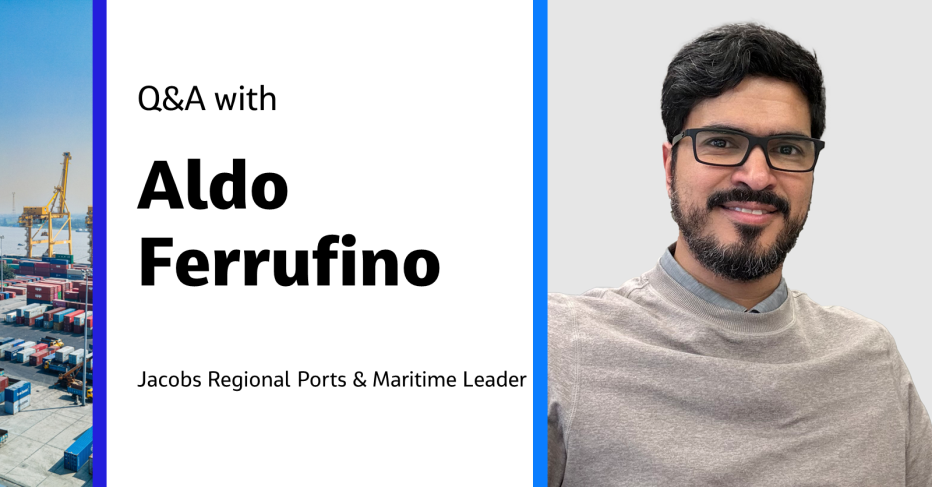A View on the Future of Ports Decarbonization: A Q&A with Aldo Ferrufino
Global ports & maritime leader bringing fresh energy to ports in the Pacific Northwest

Ports are vital infrastructure links in the global logistics chain – facilitating trade and commerce, providing connectivity between people and businesses, supplying our nations with goods and energy resources, and generally underpinning our economies and livelihoods.
Ports are at a critical juncture – they must be operationally resilient, efficient, safe, and profitable, while at the same time, must navigate modern day challenges, optimize operations, decarbonize themselves, and serve as a key enabler for the world’s energy transition.
At Jacobs, we draw on a maritime business heritage that spans more than 150 years to help our ports and maritime clients manage their operations, build and maintain their infrastructure, protect their coastlines, convey people and goods, and serve as critical infrastructure hubs. Today, we’re helping them with their decarbonization journeys and to optimize operations for a more connected, sustainable tomorrow. Our more than 500 in-house port and maritime professionals around the world have navigated some of the world’s largest and most complex programs, bringing in-depth understanding of the complex nature of maritime infrastructure.
In this Q&A, we connect with one of these teammates, Aldo Ferrufino, our Americas West Regional Ports & Maritime Leader. Leveraging his broad global experience that crosses over two dozen countries and included projects in Latin America, Asia-Pacific, Middle East, Europe, Africa, and North America, Aldo is now helping grow our portfolio of port infrastructure and decarbonization efforts.
Hi, Aldo. Tell us about your role.
I’m the Regional Ports & Maritime Market Solutions Lead for the Americas West, Group Lead, and Client Service Lead for Ports & Maritime in the U.S. Pacific Northwest at Jacobs. I’m also a key member of the global Ports & Maritime leadership team and a go-to resource for containerized and port development matters, having formerly served as Jacobs’ Global Principal for Containerized Ports.
What are the biggest opportunities ahead in the energy transition for ports?
At Jacobs, we’ve embraced the focus on decarbonization across our transportation modes and port projects are no exception. It’s an area of great challenges and growth, which directly aligns to our company’s strategy, mission and culture, to do what’s right and challenge the accepted.
The concept of energy transition in ports isn’t new, for example – shore power and electrification of container yard equipment have been around over 20 years; the difference now is that electrification has become more accessible and efficient for ports to implement and is often a requirement versus a “nice to have.”
The opportunity we have today in our industry is unique, as the current environment further enables developing energy transition strategies with multiple touch points and variable outcomes that consider tailored solutions, which must be realistic and achievable to each individual port case. There isn’t a single answer to energy transition, but the right approach toward it seems to be a blend of options aligned with the port and stakeholder realities, and calibrated expectations.
What are some of the key challenges ports, and the broader transportation market, face when it comes to decarbonization?
The challenges for decarbonization in the transportation industry, including ports, is varied but have commonalities, which revolve around their specific application to our clients and their operations. Some challenges, and opportunities, we face are related to:
- Technology maturity and applicability.
- Diversity of energy sources.
- Reliable fleet data.
- Energy supply chain and its availability.
- Social and human factors.
- Commercial commitments from stakeholders.
- Financial and risk commitments.
- Legal and regulatory issues.
A simple anecdote: for decades enterprises have focused on reducing electricity consumption through multiple initiatives. Now, with the broad electrification of operations, we’re posed to significantly increase electrical consumption, which in turn must be supported by the electric grid, hence, we are challenged to diversify renewable energy sources to enable this vital transition.
How will data solutions and technology aid the ports sector going forward?
This question answers itself – data solutions and technology have always aided the ports sector, but there are caveats. The port sector is rich in data but is generally fragmented, partially recorded (or unrecorded), and when considering the number of ports and terminals around the world, more needs to be done. This isn’t a new phenomenon.
The fundamental aspects to consider for effective application of technology solutions revolve around data gathering, quality and management, and using this data to develop technology solutions that address specific existing challenges unique to each operation. Other factors are technology maturity, the resistance to embrace these technologies, and their effect in the operations and human interactions.
Decarbonization in ports starts with a mandate and/or need that informs and drives items like engineering design, infrastructure works, procurement of electrified mobile equipment. What needs to be considered beforehand is a realistic and holistic strategic plan that involves top-down business drivers, operational challenges, funding, data management, stakeholder roles, utility capacities, technology maturity, and of course, other factors unique to each facility.
We hear you’ve had quite a win streak lately. Can you tell us about some of the work we’ll be taking on in the coming year?
We’ve been part of a fantastic set of opportunities and growth in the Pacific Northwest, where ports are keen to modernize and decarbonize their facilities with realistic, innovative and diverse approaches.
We have projects now starting with two of the top three major ports in Washington state, and other key ports around the world. Each of these projects are important to us at Jacobs as they connect to a global network of ports we serve and to Jacobs’ commitment to creating a more connected, sustainable world. These projects all share key themes and goals, revolving around decarbonization and modernization, and face similar challenges in terms of funding, utility capacity, legislation, technology and workforce to deliver.
In 2024, we’ll be engaging with exciting modernization and decarbonization projects, and helping our clients identify other verticals that they can benefit from focusing on: business evolution, climate adaptation, assets and operations.
What do you enjoy most about being part of #OurJacobs team?
The diversity and camaraderie we have in our teams, and I’m especially proud of our inclusion and diversity, particularly in the Pacific Northwest. Our professional and personal backgrounds are rich and diverse, blending engineering, technology, operations and resiliency together. Our team combination with David Nguyen, our key electric vehicles and electrification resource, and Elizabeth Leavitt, our key resiliency resource, along with our ports and infrastructure team creates a collaborative consulting and advisory platform - allowing our clients to share their stories and create lasting, innovative solutions.
About the interviewee

Jacobs U.S. West Regional Market Solutions Lead and Northwest Ports and Maritime Group Lead, Aldo Ferrufino is a seasoned and diversified port industry leader with over 25 years of proven track record holding senior positions in multiple organizations around the world in the technology, ports & logistics, engineering and construction industries. His experience ranges from startups to multinational companies, covering the development and delivery of multi-million-dollar port and marine infrastructure, its management and operations.
Aldo’s work experience and strategic thinking brings unique added value innovation, vision and change perspective to businesses and projects, creating transformational platforms for businesses to establish foundations for sustainable growth. His experience encompasses multiple countries worldwide including the U.S., Asia, Middle East, Latin America, Europe and Africa regions.
Future Foundations.
Co-creating the world to come

From developing climate resilience and transitioning to a low-carbon future, to modernizing and transforming infrastructure, governments and businesses face critical challenges. How they respond will define our future.
As our clients navigate these challenges, we help them think differently – working together to pioneer tomorrow's infrastructure solutions and build the foundations for a prosperous, secure future.














































